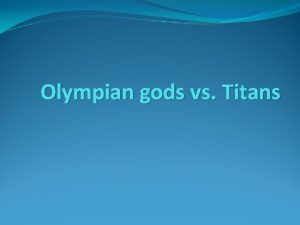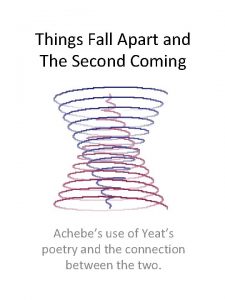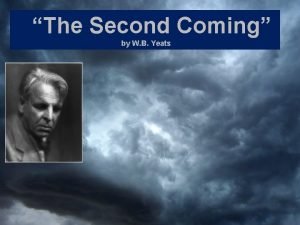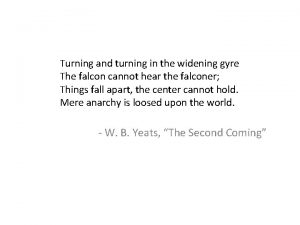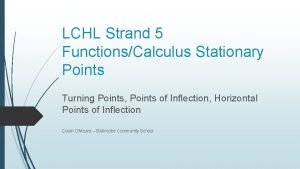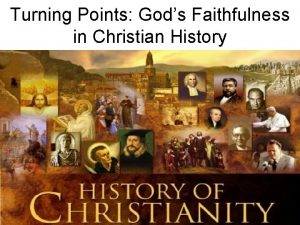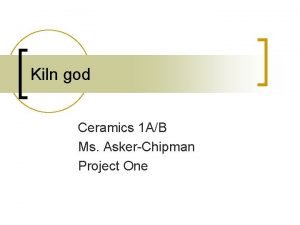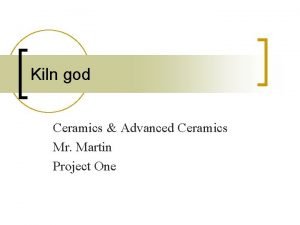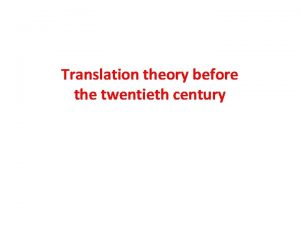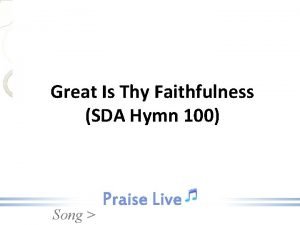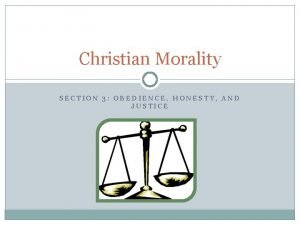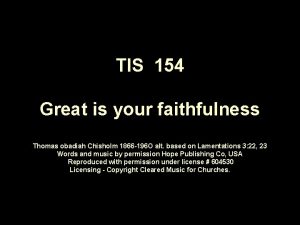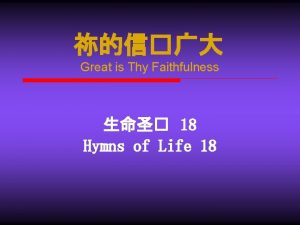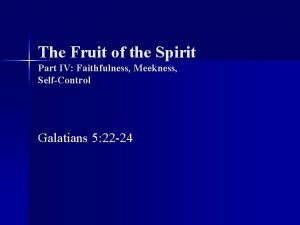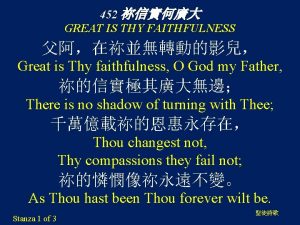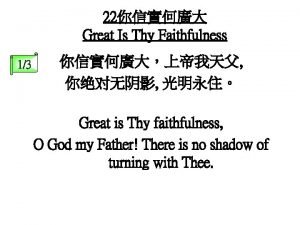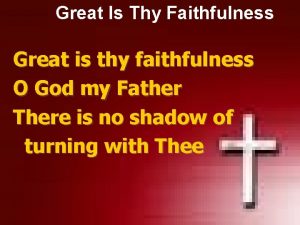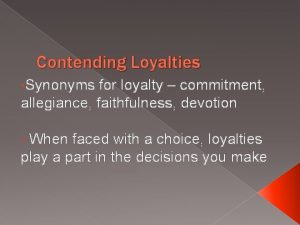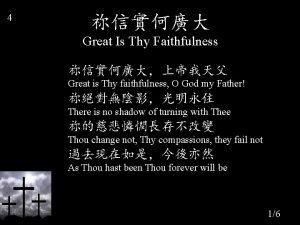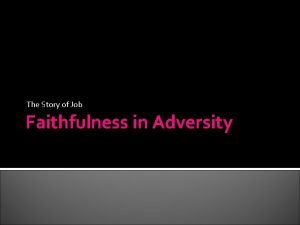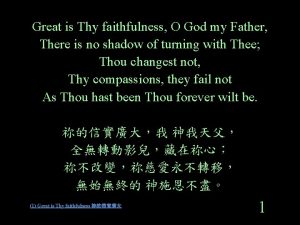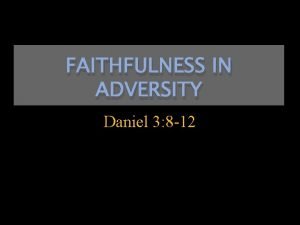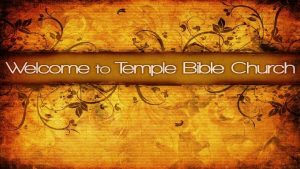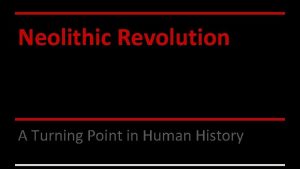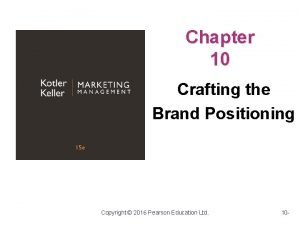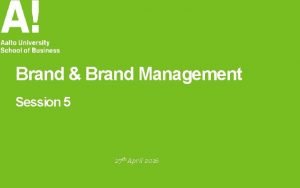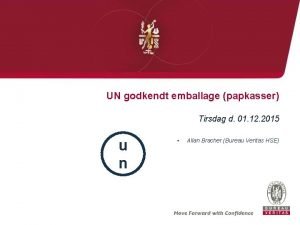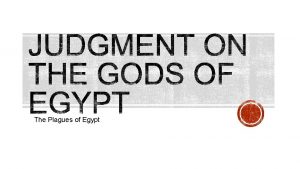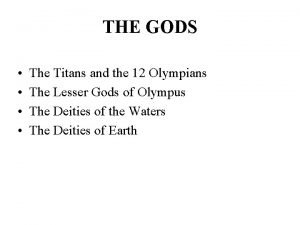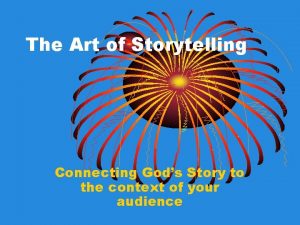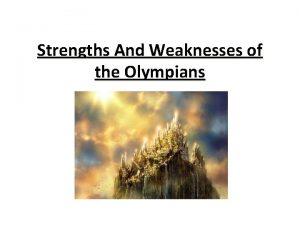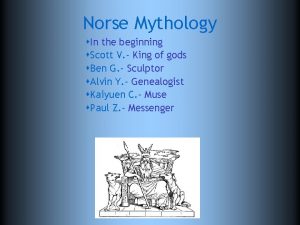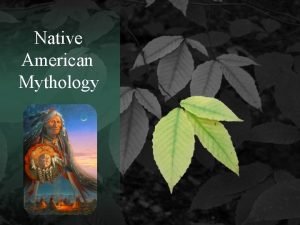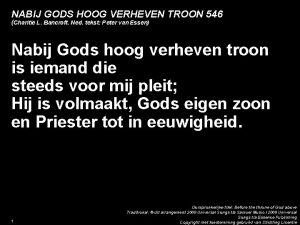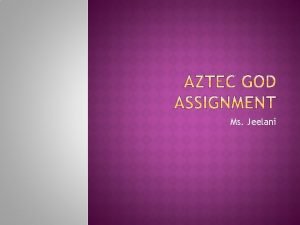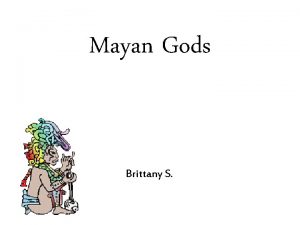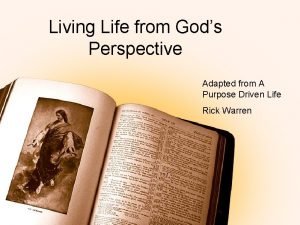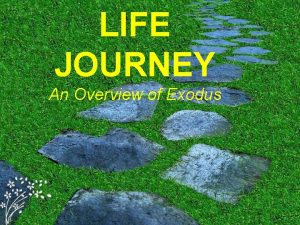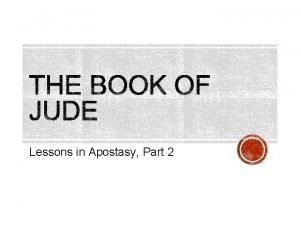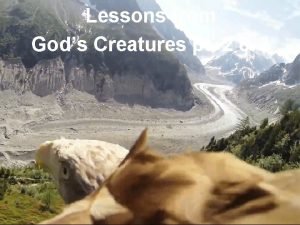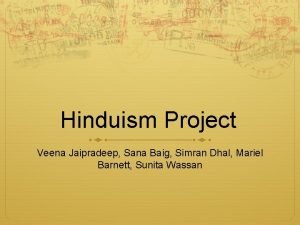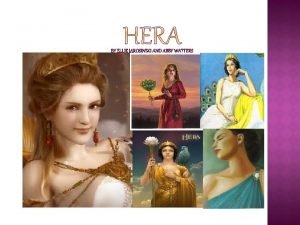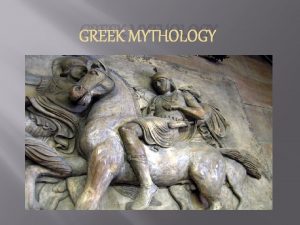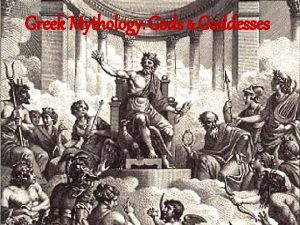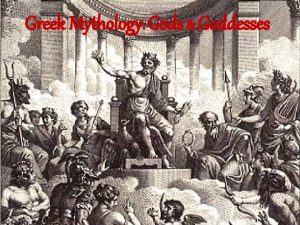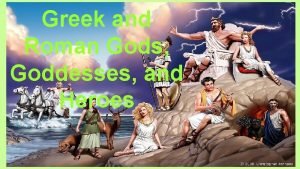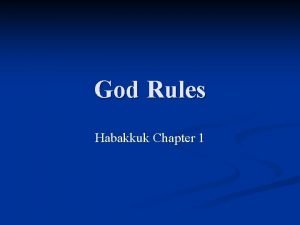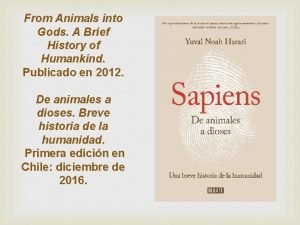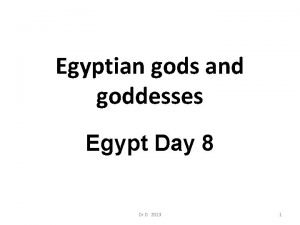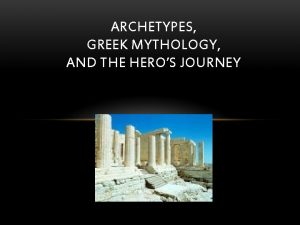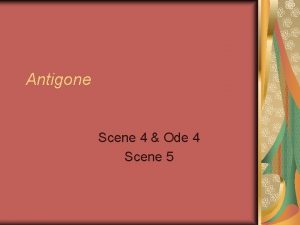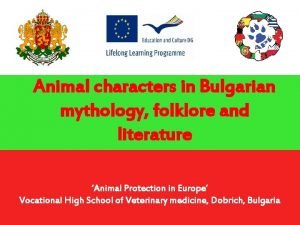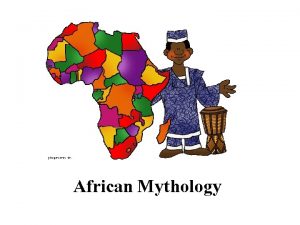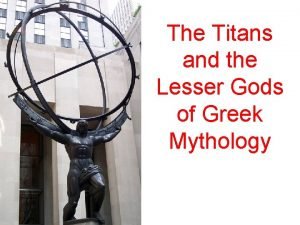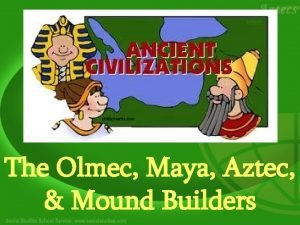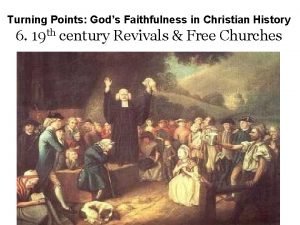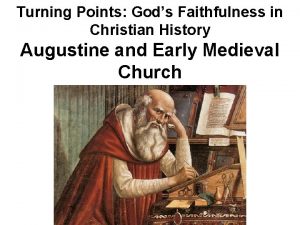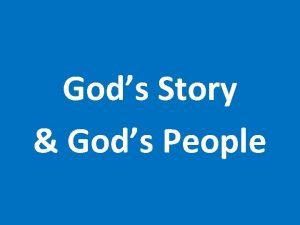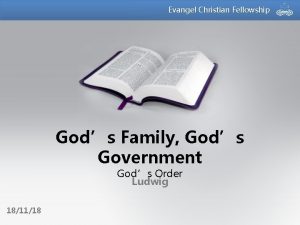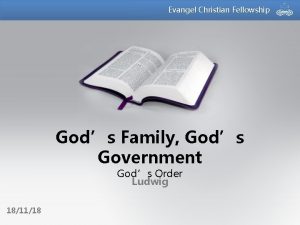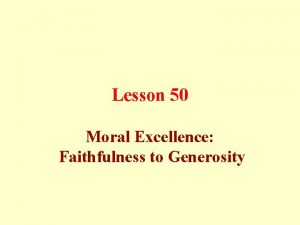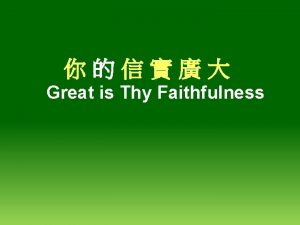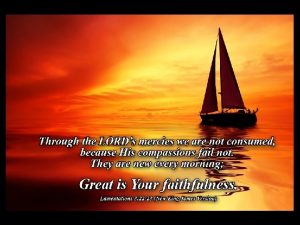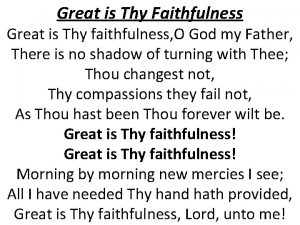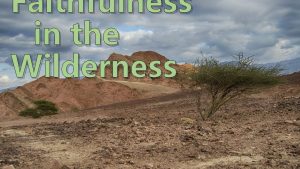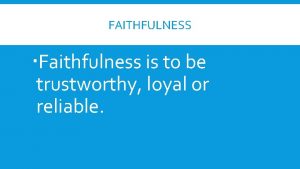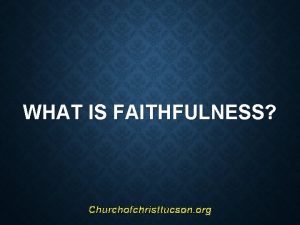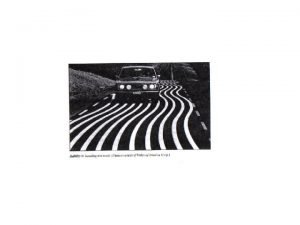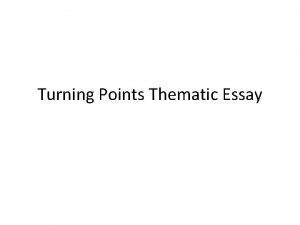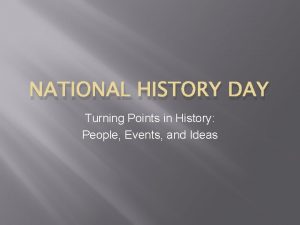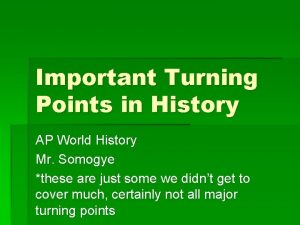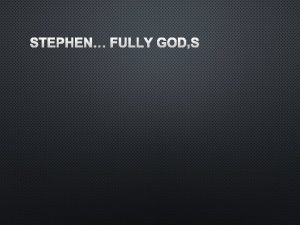Turning Points Gods Faithfulness in Christian History 1





















![Saul of Tarsus to St. Paul [5 -6] He said, “Who are you, Master? Saul of Tarsus to St. Paul [5 -6] He said, “Who are you, Master?](https://slidetodoc.com/presentation_image_h2/45bd4261defba15ddeebf584f87e2a85/image-22.jpg)













































- Slides: 67

Turning Points: God’s Faithfulness in Christian History 1

Outline of course Mark Noll, Turning Points: Decisive Moments in the History of Christianity (Baker, 1997; 3 rd ed. 2012). “‘All authority in heaven and earth has been given to me’. Nothing could now happen to the followers of Christ that lay outside the reach of his sovereignty; no experiences that the church underwent, no matter how glorious or how mundane, were irrelevant to the living Word of God. ” “‘Therefore go and make disciples of all nations’. ‘[S]urely I will be with you always, to the very end of the age’. ‘[Y]ou will be my witnesses… to the ends of the earth’. ” 2

Outline of course Noll, Turning Points, asks, why study Church History? 1. Irreducibly historical character of Christianity. Prophecies fulfilled; Christ’s earthly life; acts of God in time and space. 2. Interpretation of Scripture in the Church over time. 3. Understanding Christianity in different cultures (contextualization). 4. “God sustains the church despite the church’s frequent efforts to betray its savior and its own high calling…. ” Response: Gratitude / Humility 3

Outline of course “Turning Points: God’s Faithfulness in Christian History” Turning points= often after crises or deep challenges breakthroughs of new understanding of Gospel & God’s providence in history. 1. Birth of Christianity AD 30 -312. *establishing Christian teaching & organization 2. Development of Early Christianity AD 300 -600. *Augustine, monasticism, mission in Europe 3. Renaissance Search for God and Self AD 1200 -1500. (Mendicant orders, mystics, Modern Devotion, Christology & Art) 4 *personal devotion

Outline of course 4. Reformation of Church & Doctrine: Luther & Calvin 16 th c. . *reform doctrine & practice 5. Post-French Revolution/ 19 th century. Free churches, le Réveil, American Awakenings/Revivals, Social concerns—Salvation Army, Social Gospel…) *revival & recovery after Enlightenment & wars 6. Missions to the World 1910 -1970 s: From Edinburgh to Urbana; Wycliffe to Jesus Movement. *contextualization of the Gospel in the world 5

Questions: Outline of course Where is Christ in each generation? How are Christians influenced by the world around them? Romans 12: “ 1. I appeal to you therefore, brothers, by the mercies of God, to present your bodies as a living sacrifice, holy and acceptable to God, which is your spiritual worship. 2 Do not be conformed to this world, but be transformed by the renewal of your mind, that by testing you may discern what is the will of God, what is good and acceptable and perfect. ” We are all products of our time: our generation, our culture……. 6

Outline of course How do we discern true Christian (communal/ covenantal/ personal) commitment (beyond institutional involvement)? Church attendance, language (buzz words) of expression, actions, piety & devotion, ……. What is normative practice? (normative= should be practiced for all time). Yet all Christians are part of a particular culture(s) and a time (era). GOD is faithful! As we have heard in several sermons this Fall 2015: Why does God appear to be silent at times? 7

Outline of course How do we KNOW? A. Internal= Divine Revelation in scripture (human authors inspired by God) & ministry of the Holy Spirit. B. External= Early Christian sources…. & Non-Christian historical sources : Josephus, Jewish Antiquities, mentions Jesus, and the condemnation of one James by the Jewish Sanhedrin. This James, says Josephus, was “the brother of Jesus the so-called Christ. ” Roman historian Tacitus: Emperor Nero blamed Christians for fire destroyed Rome A. D. 64: “Nero fastened the guilt. . . on a class hated for their abominations, called Christians by the populace. Christus, from whom the name had its origin, suffered the extreme penalty during the reign of Tiberius at the hands of. . . Pontius Pilatus, and a most mischievous superstition, thus checked for the moment, again broke out not only in Judaea, the first source of the evil, but even in Rome…. ” See F. F. Bruce, Jesus and Christian Origins Outside the New Testament. 8

Outline of course Getting out of our own culture to past interpretations. Christopher A Hall, Reading Scripture with the Church Fathers. IVP, 1998. Daniel H. Williams, Evangelicals and Tradition: The Formative Influence of the Early Church. Baker, 2005. Tradition, Scripture, and Interpretation: A Sourcebook of the Ancient Church. Baker, 2006. Scripture). Gerald L. Bray, ed. Galatians, Ephesians (Reformation Commentary on IVP, 2011. 9

Outline of course Anthony Lane, John Calvin Student of the Church Fathers. Baker, 1999. [London School of Theology, see You. Tube as well] John Calvin, 365 Days with Calvin: A Unique Collection of 365 Readings from the Writings of John Calvin, ed. Joel Beeke. Day One Publications & Reformation Heritage Books, 2008. 10

Outline of course Noll, Turning Points Psalm 90: 1, 12…. 19 “Lord, you have been our dwelling place throughout the generations…. . Teach us to number our days aright, that we may gain a heart of wisdom. … Make us glad for as many days as you have afflicted us, for as many years as we have seen trouble. May your deeds be shown to your servants, your splendor to their children. May the favor of the Lord our God rest upon us; establish the work of our hands for us— yes, establish the work of our hands. ” 11

An Eastern Orthodox Perspective 12

Protestant Perspectives Typical Protestant perspective: not long after founding of early church it developed unorthodox practices; only small remnant of real Christians survived until Reformation 16 th c. Second group Protestants further claim it was not enough & “Second Reformation” necessary (17 th 18 th 19 th c. ). Calvin & “Reformed” did not fully reject Church, but claimed to reform doctrine & practice. Calvin eagerly studied many medieval theologians. 13

Timeline of Christianity 1550 onward many divisions

Development of Early Christianity A. D. 30 -350 15

Late Roman Empire, A. D. 117 16

Jesus of Nazareth Joseph & Mary of Nazareth, Galilee, travelled to Bethlehem, Jesus born. Born: c. 7– 2 BC Died: c. 33 AD Jesus= Latin Iesus ; Hebrew-Aramaic = יהושע Joshua, i. e. “Yahweh delivers. ” Real name= Joshua bar Joseph (son of Joseph) & Mary (Davidic line) 17

Who was Jesus? Claims= 1. Scripture: Matt. 2: 1 -6 quotes Micah 5: 2 – Jesus= Messiah: “But you, O Bethlehem Jesus of Nazareth Ephrathah, who are too little to be among the clans of Judah, from you shall come forth for me one who is to be ruler in Israel, whose coming forth is from of old, from ancient days. ” 2. Nature: “star” 3 kings/ wisemen “magi” to Jesus. Matt. 2: 2 “Where is He who has been born King of the Jews? For we have seen His star in the East and have come to worship Him. ” 18

Jesus of Nazareth, the Christ Jesus (=name) Christ (=title): Christ= Χριστός Christós (Greek) = Hebrew “messiah” (anointed one as savior & liberator) Gospels: came “give his life as a ransom for many” & “preach the good news of the Kingdom of God. ” Ministry: Jesus teacher; miracles: healings, exorcisms, walking water, water into wine, raised several dead= Lazarus (John 11: 1– 44, Matt. 9: 25, Luke 7: 15). 19

Jesus of Nazareth, Crucifixion & Resurrection 12 Disciples at “Last Supper. ” Record of his death: 1. Pilate condemned Jesus; 2. crucified (c. 33); 3. after 3 days he arose= Resurrection. 20

Acts 9: Saul of Tarsus (c. 5 -67 AD) to Paul: conversion c. 35 -36 AD [1 -2] “All this time Saul was breathing down the necks of the Master’s disciples, out for the kill. He went to the Chief Priest and got arrest warrants …. [3 -4] …outskirts of Damascus, he was suddenly dazed by a blinding flash of light. As he fell to the ground, he heard a voice: “Saul, why are you out to get me? ” 21
![Saul of Tarsus to St Paul 5 6 He said Who are you Master Saul of Tarsus to St. Paul [5 -6] He said, “Who are you, Master?](https://slidetodoc.com/presentation_image_h2/45bd4261defba15ddeebf584f87e2a85/image-22.jpg)
Saul of Tarsus to St. Paul [5 -6] He said, “Who are you, Master? ” “I am Jesus, the One you’re hunting down. I want you to get up and enter the city…[17 -19] So Ananias went and found the house, placed his hands on blind Saul, and said, “Brother Saul, the Master sent me, the same Jesus you saw on your way here. He sent me so you could see again and be filled with the Holy Spirit. ” “Apostle of the Gentiles” 22

St. Paul in the Hellenistic World Christianity in Hellenistic world; Paul used Greek philosophy & reason. Equated “God” to Athenian statue “TO THE UNKNOWN GOD. ” Acts 17: 22 -32: “what therefore you worship as unknown, this I proclaim to you. The God who made the world and everything in it, being Lord of heaven and earth, does not live in shrines made by man…. ” altar to Unknown god, Athens 23

St. Paul in the Hellenistic World Plato’s cave analogy used powerful, meaningful language of the day Paul: 1 Cor. 13: 12: “Now we see through a mirror dimly (glass darkly), but then face to face…. ” John: John 1: 5: “The light shines in the darkness, and the darkness did not overcome it. ” Qualifies reason: Romans 8: 6 “For to be carnally minded is death, but to be spiritually minded is life and peace. ” Thus, divine reason over human reason. 24

St. Paul’s Missionary Journeys

Paul’s Missionary Journey & Letters A. To Celts: Galatians Paul’s letters books NT B. To Greeks: Ephesians Philippians Colossians Thessalonians(2) Corinthians(2) C. To Romans: Romans 26

Christ & disciples. Painted panel in Coptic museum, Cairo Coptic Christians today: c. 16 million: c. 12 million Egypt + c. 3 -4 million abroad (Diaspora) 27

Coptic Christians Contributions: 1. Birthplace of monasticism: 1 st = hermits imitated Jesus’s 40 days in desert. St. Anthony the Great (c. 251– 356). Biography by Athanasius of Alexandria inspired Christians w/ how Anthony overcame temptations. Monasticism = called “white martyrdom” no blood shed; underlines pilgrimage through this world= “not my home. ” 28

Coptic Christians 2. Didascalia =famous catechetical school Alexandria early Christian scholars showed reason & revelation, philosophy & theology compatible. Most famous= Origen; said he wrote more books than anyone could read. Origen evangelized Jews in Palestine w/message that Jesus fulfilled all promises of God in OT. Exposition of Bible, day by day, chapter by chapter, was an effective evangelistic technique. PROBLEM: Teachings extremely controversial pre-existence of souls, final reconciliation of all creatures, including perhaps even devil (apokatastasis), subordination of Son of God to God the Father. 29

Tertullian (c. 160 -c. 220 ) AD Carthage: wealthy, educated citizen exercised all passions (gladiators, sex, food). Struck w/ courage Christian martyrs & converted. Totally rejected philosophy; NO value to Christian theology; became great apologist, book Apologeticum pro Christianis. “Father of Latin Christianity”: pushed “apostolic succession” proof correct doctrine & practice. Promoted very strict discipline & practice; abstaining from “worldly” pleasures. Underlined responsibility for developing spiritual life. Coined phrases: 1. “What has Athens to do with Jerusalem? ” 2. “Trinity” used in Nicene Creed. 30

Tertullian, De praescriptione haereticorum (On the prescription of heretics), chap. 7 Tertullian claims Paul: “names philosophy as that which he would have us be on our guard against. … ‘See that no one beguile you through philosophy and vain deceit, after the tradition of men, and contrary to the wisdom of the Holy Ghost. ’ … at Athens, … had in his interviews become acquainted with that human wisdom which pretends to know the truth, whilst it only corrupts it, …. What indeed has Athens to do with Jerusalem? What concord is there between the Academy and the Church? what between heretics and Christians? … ‘the Lord should be sought in simplicity of heart’. Away with all attempts to produce a mottled Christianity of Stoic, Platonic, and dialectic composition!” 31

5 Principal Cities (religious authority): Alexandria; Jerusalem; Antioch; Constantinople; Rome 32

Christianity to Asia Well-known Eusebius of Caesarea (early 4 thc. ) & Saint Jerome (late 4 thc. ) report missionaries to India. 12 Disciples/ Apostles: Thomas the Apostle: Muziris, India AD 52; baptized several people, founding Saint Thomas Christians or Nasranis. Saint Bartholomew: India 1 stc. (left Gospel of Matthew there). Others: Saint Pantaenus the Philosopher: Greek theologian in Catechetical School of Alexandria (c. AD 180) to India. Olopun, Syrian monk: stone stele (AD 781) records to capital of China in 635 AD (Tang Dynasty, Chang An or Xi’an) but disappears c. AD 800 w/ fall of Tang. 33

Spread of Christianity Roman Empire YEAR 100 : 150: 200: 250: 300: 350: Number Percentage of Roman Empire 7, 500 0. 0126% 41, 000 0. 07% 220, 000 0. 36% 1. 7 million 1. 9% 6. 3 million 10. 5% Constantine 312 34 million 56. 5% See Rodney Stark, The Rise of Christianity: How the Obscure, Marginal Jesus Movement Became the Dominant Religious Force in the Western World in a Few Centuries (Princeton UP, 1996; Harper, 1997). 34

TODAY 1. United States 229, 157, 250 2. Brazil 169, 213, 130 3. Mexico 106, 204, 560 4. Nigeria 80, 510, 000 5. Philippines 78, 790, 000 6. Russia 67, 640, 000 7. China 67, 070, 000 8. Democratic Republic of the Congo 63, 150, 000 9. France 55, 948, 600 10. Italy 55, 832, 000 11. Ethiopia 51, 477, 950 12. Germany 50, 752, 580 13. Colombia 44, 502, 000 14. Ukraine 41, 973, 000 15. South Africa 40, 243, 000 16. Spain 38, 568, 000 17. Poland 36, 526, 000 18. Kenya 33, 625, 790 19. Argentina 33, 497, 100 20. United Kingdom 33, 200, 417 35

36

Spread of Christianity Roman Empire Sociological Questions: Appeal of Christianity: Ekklesia (Athenian= all citizens; not based birth, wealth, but residence)= followers Jesus Christ (“Church” later English). Matt. 16: 18: “…upon this rock I will build my church…” [Gk. “Ekklhsian”; Latin “ecclesiam”] “There is no longer Jew or Greek, there is no longer slave or free, there is no longer male and female; for all of you are one in Christ Jesus. ” (Galatians 3: 28) Contrast Rome & Christianity 1. From Social Inequality (female infanticide) to Equality: Church= Ekklesia (all equal in God’s sight) & Dignity of Human Life (imago dei); 2. From Emperors as gods—plurality of impersonal gods—to one God of Love. 37

Spread of Christianity Roman Empire 3. From little Social Care to Family: Ekklesia= Matt. 25: 40 “…done to least of brethren, you have done to Me”; Acts 4: 32 -35: “…whole congregation of believers was united as one—one heart, one mind! They didn't even claim ownership of their own possessions. …They shared everything. … Those who owned fields or houses sold them and brought the price of the sale to the apostles and made an offering of it. ” 4. Promise of salvation & afterlife to ALL who believe. Unique to Christianity that a. open to all b. resurrected body. Death= sleep. 38

How Did the Early Christians Describe Themselves? The Epistle to Diognetes , c. AD 130 “For the Christians are distinguished from other men neither by country, nor language, nor the customs which they observe. For they neither inhabit cities of their own, nor employ a peculiar form of speech, nor lead a life which is marked out by any singularity. The course of conduct which they follow has not been devised by any speculation or deliberation of inquisitive men; nor do they, like some, proclaim themselves the advocates of any merely human doctrines. But, inhabiting Greek as well as barbarian cities, according as the lot of each of them has determined and following the customs of the natives in respect to clothing, food, and the rest of their ordinary conduct, they display to us their wonderful and confessedly striking method of life. ” 39

How Did the Early Christians Describe Themselves? The Epistle to Diognetes , c. AD 130 They dwell in their own countries, but simply as sojourners. As citizens, they share in all things with others and yet endure all things as if foreigners. Every foreign land is to them as their native country, and every land of their birth as a land of strangers. They marry, as do all others; they beget children; but they do not destroy their offspring. They have a common table, but not a common bed. They are in the flesh, but they do not live after the flesh. They pass their days on earth, but they are citizens of heaven. They obey the prescribed laws, and at the same time surpass the laws by their lives. They love all men and are persecuted by all. … When punished, they rejoice as if quickened into life; they are assailed by the Jews as foreigners and are persecuted by the Greeks; yet those who hate them are unable to assign any reason for their hatred. To sum it all up in one word -- what the soul is to the body, that are Christians in the world. ” 40 See www. christianity. com

Persecution of Christians Roman State Religion= fulfilled state duties; state dependent on will of gods! Christianity= fulfilled individual & community needs. Accused of : 1. Atheism= disbelief in Roman gods (& Emperor) & taught corporate unity above the state. 2. Cannibalism (eating Eucharist) 3. Corrupting morals (not patriotic= venerate Emperor) 4. Corrupting family (marriage, place of women) Persecutions (under Emperors): few 1 st -2 nd c; increased by 3 rd c. 1. Nero: 64+ sporadic/ localized 2. Domitian: 81 -96 sporadic 3. Marcus Aurelius: 177+ 41 4. Diocletian: 284 -305 goal of total extermination

Persecution of Christians 42

Emperor Nero Claudius Caesar Augustus Germanicus (37– 68 AD) 54 -68: diplomacy, trade, increase cultural capital of Empire. Tyrannt: political & familial executions= mother & adoptive brother. Advisor Seneca murdered. FIRE: 64 AD fire merchant area Rome; summer winds spread 6 days 70% city ruined! Blamed Christians. Tacitus, (Annals XV. 44 ) Nero ordered Christians thrown to dogs, others crucified or burned as lights. 43

The Crucifixion of Saint Peter Michelangelo Merisi da Caravaggio (1571 -1610) painting 1601 intensely emotional realism= formative influence Baroque school. use chiaroscuro or Tenebrism= shift from light to dark w/little intermediate value.

“martyr”= witness Christian Martyrdom “The blood of martyrs is the seed of Christians” (Tertullian). Martyrdom of St. Andrew Killed by stone (St. Stephen); crucifixion (St. Peter); wild animals; burned at stake; beheaded (St. Paul). below St. Andrew’s Cross, also St. Patrick’s Saltire; Scotland, Low Countries, Russian navy, Confederate flag, etc. ) 45

Early Christian Worship: Eucharist & Catacomb One of earliest Christian hymns= Gloria Patri “Glory Be to the Father” Psalms continued to be sung from Hebrews through Middle Ages— often no musical instruments. 46

Early Christian Symbols Jesus Christ God's Son Saviour Ἰησοῦς Χριστός, Θεοῦ Υἱός, Σωτήρ" [Iēsous Christos Theou Yios, Sōtēr] Acronym= Greek word for fish 47

Constantine: 312 Conversion Christianity; 325 Council of Nicea= Nicene Creed; 330 moved capital Rome to Constantinople Constantine won Battle of Milvian Bridge & accepted Christianity. below : “Chi Rho”= “CR” in Christos; Cathedral “Hagia Sophia” 48

Major Christian Questions Question One: How is Christianity Different than Judaism? (first followers of Jesus all Jewish & accept complete Hebrew scripture) 1. Jesus “Messiah” & “Christos. ” Jews rejected claim. 325 AD Nicene Creed= Jesus Christ, Son of God; thus TRINITY 2. Freedom from Mosaic Law (OT)? : I Cor. 8 exempts Christians from dietary, ritual laws. Christians natural law: Romans 1: 19 “what may be known of God is manifest in them, for God has shown it to them. ” Christians accepted “imago dei ” concept. KNOW God’s law in scripture & nature. 49

Major Christian Questions 3. Separate People like Jews? NO: Christians are “Twin Citizens”: Live as Roman citizens, don’t violate God’s law if Rome asks too much. Matt. 22: 15 -21: “…Render therefore to Caesar the things that are Caesar’s, and to God the things that are God’s. ” Rom. 13: 1 -7: “…be subject to the earthly authorities. ” YES: Tertullian taught separation. John 18: 36: “My kingdom is not of the world. ” 2 Cor. 6: 17: “ Come out from among them and be ye separate…” 50

Major Christian Questions Question Two: How Does Greek Philosophy Help Explain the Nature of the World? Stoics: force (divine spark) in people discern natural law= Logos. Christians : natural law as faculty/ability inherent in people (imago dei). What role “pagan” philosophy in Christian theology? Like Jewish roots, some philosophy becomes foundation theology, but transformed w/ Christian meaning. CONTRAST: A. Tertullian rejected all Greco-Roman philosophy. B. Augustine used some Greco-Roman philosophy, stern warnings w/ some conclusions. 51

FAITH ? Major Christian Questions Faith “blind ”? not thinking, but pure hope—don’t know; or emotions & feelings. Early Christian Faith [Latin= fides] = knowing and acting. Greek πιστις /pi'stis = faithfulness, fidelity, loyalty, commitment, trust, belief, proof. 1. Paul’s Letter to Hebrews 11: 1, faith= “assurance of things hoped for, conviction of things not seen. ” 2. “things seen”= belief Jesus= Son of God (Logos): saw miracles, heard teaching, saw after resurrection. Faith= summary of truths revealed in Bible & Jesus’ life. Aquinas: “the act of the intellect assenting to a Divine truth owing to the movement of the will, which is itself moved by the grace of God. ” 52

Orthodoxy & Heresy in early Church 200 AD 53

Spread of Christianity Roman Empire Noll, Turning Points. Canon: Scripture as the measure of belief and faith. Hebrew bible/Old Testament= God’s Word to Jews & earliest Christians. Gospel records of Jesus’ life and ministry & letters of Paul= scripture? Episcopacy: governance and authority in the church. Religious institution grew out of Jewish practice, but expanded. Creeds: summary of belief (correct interpretation of scripture). By 2 nd century numerous new religious beliefs based on some Christian principles, but most considered heresy. 54

The Bible: Hebrew (OT) & New Testament: 27 books called “canon” =rule, measurement Final agreement AD 367 Athanasius’ list. 1. Gospels: Matthew, Mark, Luke, John= story of Jesus 2. Acts of the Apostles= story of early Church [history] 3. Pauline letters to churches (14) 4. other books: Hebrews written to Jewish Christians Jerome trans. Greek/Aramaic to Latin=Vulgate 382 -405 55

Nicene Creed , 325 AD Using terms & concepts in our culture/civilization to describe the Gospel. Use but not abuse. Start with but transform. Stoic LOGOS explains Jesus’ divinity & humanity? Yes, and No. Dominant form/ structure of belief in Rome= Stocism “Stoa”=porch of philosophers. School of Stoicism, Athens: Zeno, 3 rd BC. Goals: (self-knowledge) Eudaimonia = happiness, flourshing, well-being (Aristotle) Logos = Universal reason; the One; essence of world (rational providence) substitute = fire (original energy) personified in deity/ god (not a real person or entity). 56

Stoicism: structure of thought Logos : known through Reason (i. e. individual thought), but reason in group (arête = virtue for group). Humans (animals) = emanations from Logos, divine spirit (fire) in them (daimôn). Suffering = positive effect on soul. Aristotle: one practices recollection since emanation, one has already heard but forgotten. Oneness of all humanity (fraternity & brotherhood). Origen came closest to linking Christ to Logos, and was condemned for this. Orthodox Christianity, however, used word Logos, but at a certain point distanced themselves from any further analogies. 57

Nicene Creed , 325 AD Trinity affirmed: God= One Being (essence) Three Persons 1. God Father (in heaven) 2. Jesus= fully God & fully man (came to earth; then heaven) 3. Holy Spirit (also lives in Christians) “Logos” Greek for Word, but more in the sense of will, desire, one gives one’s word. John 1: 1= Ἐν ἀρχῇ ἦν ὁ λόγος, καὶ ὁ λόγος ἦν πρὸς τὸν θεόν, καὶ θεός ἦν ὁ λόγος “In the beginning was the Logos, and the Logos was with God, and the Logos was God. ” 1: 14 “And the Logos became flesh and dwelt among us, and we beheld his glory, the glory as of the only begotten of the Father, full of grace and truth. ” 58

Nicene Creed, 325 “The God who is logos guarantees the intelligibility of the world… the aptitude of reason to know God…and the reasonableness of God…. ” (Ratzinger/Pope Benedict XVI) 59

Episcopacy in Early Church Question of apostolicity (Jesus disciples/ apostles ? ) Bishops (episkopoi ) Deacons (diakonoi ) Presiding officers (hēgoumenoi ) Elders (presbyteroi ) But, exactly what role is a matter of interpretation. Roman Catholic= scripture (OT/NT) & early bishops. Since so many heresies, necessity of strict authority. Also, Matt. 16: 18 -19 “ 18 And I tell you, you are Peter, and on this rock I will build my church, and the gates of hell shall not prevail against it. 19 I will give you the keys of the kingdom of heaven, and whatever you bind on earth shall be bound in heaven, and whatever you loose on earth shall be loosed in heaven. ” RC great faith that early church had very few errors. 60 Strict apostolic succession

Episcopacy in E arly Church Protestant = recognize church offices in general (teachers, elders, deacons) but see early church hierarchy more out of pragmatic necessity for times. Matt. 16: 18 -19= not reference to Peter, 1 st bishop of Rome, w/ all powers given to one person, but “keys” = salvation based on confession. Greek petro / petra (= same roots Peter & rock); Latin petrus/ petram. Thus, a monarchy in church office. Protestant rock= confession Jesus is Lord. 61

Episcopacy in Early Church Reformed = authority & office still very important as extension of biblical authority & work of Christ in His church. Bishop & Elder synonymous= same office. Corporate & covenant communities are church. Non-denominational American Evangelicals = often authority & office taught, but less important. Personal & individual relationship w/ Christ paramount. 62

Emperor Constantine’s conversion to Christianity, 312 Battle of Milvian Bridge Constantine looked at sun before battle - saw cross of light w/Greek Εν Τουτω Νικα (by this, conquer); commanded troops to place Chi-Rho on shields= victorious! (below: Milvian bridge today) 63

Emperor Constantine’s new capital: from Rome to Constantinople became Byzantine Empire (395– 1453). West (Latin) left weakened, vulnerable to barbarians. 64

A Christian Roman Empire Created “Christendom” after AD 312. “Domus ” Latin for household house (territory & institution); hold (leadership & authority over). Kingdom; freedom; serfdom……. Most of middle ages (400 -1300) w/no unified state, Roman, Catholic, western, Latin-speaking Church wielded both “swords” (temporal & spiritual); contrast to eastern, Greekspeaking Orthodox Church that had an earthly-temporal emperor & a spiritual Patriarch. However, the dream of one, holy Christian empire played out in attempt to create “Holy Roman Empire” in central, western Europe (German lands) from 962 -1806. 65

A Christian Roman Empire Official sanction & support for Christianity led to: GOOD (? ) v Widespread “conversions” in Europe supported. v Strong, organized institution (w/beautiful churches, monasteries, schools, etc. ) v Once state (Roman Empire) fell Christendom became the backbone (preserved law, order, culture). BAD (? ) v Increased hierarchy, power struggles, greed v Questionable “real” conversions & practice v Role of Church in physically punishing individuals & groups (Inquisitions) 66

410 AD Rome Sacked Goths (Visigoths=barbarian tribe) triumph. Rome tried to pay ransom; did not work. Goths sacked Rome, destroyed infrastructure, set up barbarian kingdom; enemies of eastern Byzantine Empire. Eventually unorthodox, Arian Christians. 67
 Gods vs titans
Gods vs titans Things fall apart the second coming
Things fall apart the second coming The second coming by w.b yeats
The second coming by w.b yeats Turning and turning in the widening gyre
Turning and turning in the widening gyre Quadratic graphs roots and turning points
Quadratic graphs roots and turning points Turning points function
Turning points function Key features of a parabola
Key features of a parabola Chhi 510 book summary of turning points by noll
Chhi 510 book summary of turning points by noll Crossroads turning points
Crossroads turning points Kiln god examples
Kiln god examples Kiln god ceramics
Kiln god ceramics Faithful translation example
Faithful translation example Great is thy faithfulness sda
Great is thy faithfulness sda Great is thy faithfulness 中文
Great is thy faithfulness 中文 Besides faithfulness to god what is the strongest value
Besides faithfulness to god what is the strongest value Thomas obadiah chisholm great is thy faithfulness
Thomas obadiah chisholm great is thy faithfulness Thomas obadiah chisholm great is thy faithfulness lyrics
Thomas obadiah chisholm great is thy faithfulness lyrics Meakness
Meakness Great is thy faithfulness 中文
Great is thy faithfulness 中文 Is
Is Great is thu faithfulness
Great is thu faithfulness Contending loyalty
Contending loyalty Great is thy faithfulness 中文
Great is thy faithfulness 中文 Steve jobs adversity
Steve jobs adversity Great is thy faithfulness oh god my father
Great is thy faithfulness oh god my father Daniel 3:23-25
Daniel 3:23-25 Great is your faithfulness oh god
Great is your faithfulness oh god Why was the neolithic revolution a turning point in history
Why was the neolithic revolution a turning point in history Straddle positioning
Straddle positioning Points of parity and points of difference
Points of parity and points of difference Un godkendt emballage
Un godkendt emballage The 10 plagues and egyptian gods
The 10 plagues and egyptian gods 12 titans and 12 olympians
12 titans and 12 olympians God of storytelling
God of storytelling 12 main greek gods
12 main greek gods Poseidon strengths and weaknesses
Poseidon strengths and weaknesses Sparta religion
Sparta religion Who are the gods of the north ready player one
Who are the gods of the north ready player one Norse gods family tree
Norse gods family tree Info
Info Nabij gods hoog verheven troon tekst
Nabij gods hoog verheven troon tekst Toltec gods
Toltec gods Chac mayan god
Chac mayan god From gods perspective
From gods perspective Facts about exodus
Facts about exodus Plagues and egyptian gods chart
Plagues and egyptian gods chart Gods creatures download
Gods creatures download Dasi dhals
Dasi dhals Who is the queen of gods
Who is the queen of gods Realm of hephaestus
Realm of hephaestus Gods and goddesses names
Gods and goddesses names What is a traditional story about gods and goddesses
What is a traditional story about gods and goddesses Ancient greek gods family tree
Ancient greek gods family tree Helios roman name
Helios roman name Habakkuk chapter 1
Habakkuk chapter 1 From animals into gods
From animals into gods Egyptian gods height
Egyptian gods height Hades roman name and symbol
Hades roman name and symbol The journey archetype examples
The journey archetype examples Antigone scene 4 ode 4
Antigone scene 4 ode 4 Bulgarian mythical creatures
Bulgarian mythical creatures Trojan war gods
Trojan war gods African mythology gods and goddesses
African mythology gods and goddesses Ruler of all gods
Ruler of all gods Whats god number
Whats god number Lesser gods greek mythology
Lesser gods greek mythology Olmec glyphs
Olmec glyphs Why do shinigami love apples
Why do shinigami love apples
